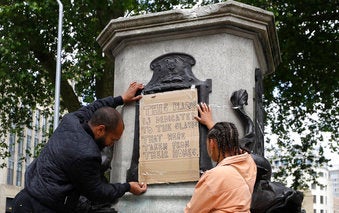London may remove statues as Floyd’s death sparks change
LONDON (AP) — London’s mayor announced Tuesday that more statues of imperialist figures could be removed from Britain’s streets following the unauthorized felling of a slave-trader’s monument, as the killing of George Floyd in Minneapolis continued to spark protests — and drive change — around the world.
On the day Floyd was being buried in his hometown of Houston, Texas, London Mayor Sadiq Khan said he was setting up a commission to ensure the British capital’s monuments reflected its diversity. The Commission for Diversity in the Public Realm will review statues, murals, street art, street names and other memorials and consider which legacies should be celebrated, the mayor’s office said.
“It is an uncomfortable truth that our nation and city owes a large part of its wealth to its role in the slave trade and while this is reflected in our public realm, the contribution of many of our communities to life in our capital has been willfully ignored,” Khan said.
International protests of racial injustice and police violence that Floyd’s May 25 death spurred show no sign of abating. A white police officer who pressed a knee on Floyd’s neck for more than 8 minutes has been charged with murder.
Staff members and lawmakers in Britain’s Parliament held a minute of silence in Floyd’s memory on Tuesday. Demonstrators planned to gather in London’s Parliament Square for a socially distanced vigil later.
France has seen nationwide protests calling for greater law enforcement accountability, and more demonstrations are planned for Tuesday evening.
Floyd’s death has resonated especially strongly in Frances’s banlieues, or suburbs, where poverty and minority populations are concentrated. Protesters marching in solidarity with U.S. demonstrations over Floyd’s death have also called for justice for Adama Traore, a young man of Malian origin whose death in French police custody in 2016 is still under investigation.
French Prime Minister Edouard Philippe has met police and citizens’ groups as part of efforts to calm tensions.
He said Tuesday that the code of police ethics would be reviewed. The French government has also announced that the chokehold would no longer be taught in police training.
Demonstrators in the U.K.and elsewhere are also seeking to right historical injustices and remove symbols of oppression. On Sunday, protesters in the southwest England city of Bristol hauled down a statue of Edward Colston, a 17th-century slave trader and philanthropist, and dumped in the city’s harbor.
Many Bristolians welcomed the statue’s removal, but the British government called it an act of vandalism and urged police to prosecute the perpetrators.
British Prime Minister Boris Johnson acknowledged that it was “a cold reality” that people of color in Britain experienced discrimination, and promised his government was committed to “eradicating prejudice and creating opportunity.”
But he said those who attacked police or desecrated public monuments should face “the full force of the law.”
Colston’s demise has reinvigorated Oxford University campaigners calling for the removal of a statue of Cecil Rhodes, a Victorian imperialist in southern Africa who made a fortune from mines and endowed the university’s Rhodes scholarships.
As the Rhodes Must Fall group planned to protest Tuesday at the statue, a banner erected in Oxford declared: “Rhodes, you’re next.”
A large statue of Rhodes that had stood since 1934 was removed from South Africa’s University of Cape Town in April 2015, after a student-led campaign that also urged the university to increase its numbers of black lecturers and to make the curriculum less Eurocentric.
In 2003, the Rhodes scholarships were renamed the Mandela Rhodes scholarships in South Africa, and a partnership was formed with the Nelson Mandela Foundation. There also was a student campaign to change the name of Rhodes University, a state university in eastern South Africa, but in November 2017 the university council voted to keep the name.
In Edinburgh, Scotland, there are calls to remove a statue of Henry Dundas, an 18th-century politician who delayed Britain’s abolition of slavery by 15 years.
The leader of Edinburgh City Council, Adam McVey, said he would “have absolutely no sense of loss if the Dundas statue was removed and replaced with something else or left as a plinth.”
Some historical figures have more complex legacies. At weekend protests in London, demonstrators scrawled “was a racist” on a statue of Winston Churchill. Britain’s wartime prime minister is revered as the man who led the country to victory against Nazi Germany. But he was also a staunch defender of the British Empire and expressed racist views.
Khan suggested Churchill’s statue should stay up.
“Nobody’s perfect, whether it’s Churchill, whether it’s Gandhi, whether it’s Malcolm X,” he told the BBC, adding that schools should teach children about historical figures “warts and all.”
“But there are some statues that are quite clear cut,” Khan said. “Slavers are quite clear cut in my view, plantation owners are quite clear cut.”
